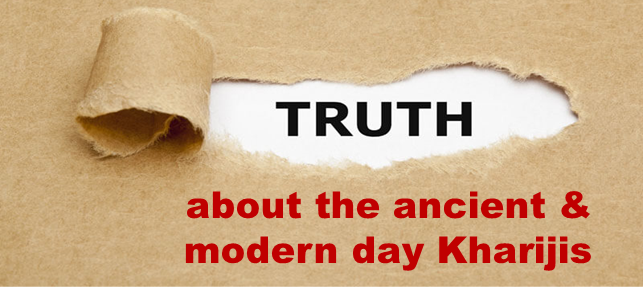
Doubt
There was a group of Muslims in the past who claimed that we must seek only from Allah. They were opposed tooth and nail by the other Muslims and were branded as Kharijis i.e. those who have abandoned religion.
There is a similar group among the Muslims today that rejects any intervention (waseelah) and maintains that we must turn to Allah alone in all matters. This group is also rejected by the majority of the Muslims and one can say that they are the modern day or neo-Kharijis.
Reply
The modern day Kharijis, also known as Salafis, have resorted to the same tactics as their ancestors by misinterpreting verses and traditions to serve their sinister agenda.
Abduallah Ibn Umar even with his basic knowledge of religion identified this trend when he condemned the Kharijis thus:
The worst creation of Allah are those who take the verses revealed for the infidels and apply them to the believers.
• Fath al-Bari v 12 p 282 (Chain is Sahih)
Like the Kharijis, Iblis also rejected the command to prostrate to Prophet Adam (a.s.) as he maintained that if one must bow, it should only be to Allah.
There is an interesting incident that helps us understand the falsity of those who reject intervention (waseelah) and show misplaced and exaggerated devotion in divine monotheism (tauheed).
Argument against the Kharijis
It is narrated that Naafe b. Arzaak came in the presence of Imam Muhammad Baqir (a.s.) and questioned him regarding the (permissible) halaal and prohibited (haram).
Imam Muhammad Baqir (a.s.) told him, “You ask these Maareqah (Kharijis) why they considered permissible rebelling against Ameerul Momineen Ali b. Abi Talib (a.s.) while in reality they were the ones who had shed their blood in his obedience in his ranks and helped him for the sake of Allah’s pleasure?
They will defend themselves saying that Ali (a.s.) had resorted to arbitration in the religion of Allah.
You tell them that Allah has appointed two arbitrators among his creatures in the codified law (Shariat) of his Messenger (s.a.w.a.) (as mentioned in the Holy Quran):
And if you fear a breach between the two, then appoint a judge from his people and a judge from her people; if they both desire agreement, Allah will effect harmony between them; surely, Allah is Knowing, Aware. (Surah Nisa (4): Verse35)
Similarly, the Messenger of Allah (s.a.w.a.) appointed Saad b. Maaz as an arbitrator of Bani Quraizah (the Jewish tribe), a decision that Allah endorsed. Likewise, you know that Ameerul Momineen Ali b. Talib (a.s.) had ordered both the arbitrators (from the two warring parties at Siffeen) to arrive at a decision according to the Holy Quran and not in transgression of it. He also imposed a condition that whoever takes a decision against the Noble Quran should be rejected outright.
But when they (Kharijis) told him (Ali (a.s.)) that you have appointed an arbitrator for yourself who has judged against you, Ameerul Momineen Ali (a.s.) replied: I had not made the creation as an arbitrator but had made the Book of Allah as the (final) arbitrator.
Now, how can these Kharijis consider such a person as deviated (we seek refuge in Allah!) who has made the Noble Quran as a judge and declared that whoever goes against the Book of Allah must be rejected except the one who does not make false allegations in his innovations.”
On hearing this, Naafe’ declared, “Never have my ears ever heard such words nor has my mind ever thought of such a thing; this is naught but the truth.”
- Al-Ehtejaaj, vol. 2 p. 324
Conclusion
The following points are clear as daylight from the incident:
- Taking an entity other than Allah, be it the Holy Prophet (s.a.w.a.), an infallible Imam (a.s.), companion or even an ordinary Muslim for actions like arbitration, assistance in matters of the world and hereafter, etc. is not against divine monotheism because the Noble Quran and Sunnah have many such examples.
- So long as the entity acts according to the Quran and correct Sunnah, Tauheed has been observed. If he acts contrary to the two pillars, then Tauheed has been violated even if the entity is the companion or wife of the Prophet (s.a.w.a.).
- When ordinary Muslims and companions can intervene in matters of the world and hereafter as waseelah, the Holy Prophet (s.a.w.a.) and his pure progeny (a.s.) are even more deserving, rather Muslims need not look beyond them for any matter of the world as well as the Hereafter.
- Some Muslims claim that we can turn to the waseelah while he is alive, but not after his death, because then it is polytheism (shirk). This argument is baseless as it misses the main principle about the waseelah, which is that it must be sanctioned by the Holy Quran and the Sunnah. Life or death is not the criterion over here. Prophet Yusuf’s (a.s.) apparently lifeless shirt is as much a waseelah to cure his father Prophet Yaqoob (a.s.) of blindness, as Prophet Yusuf (a.s.) himself. Divine Monotheism does not get compromised by taking the lifeless shirt as waseelah, else Prophet Yusuf (a.s.) would never have offered his shirt nor would Prophet Yaqoob (a.s.) have accepted it.




Be the first to comment